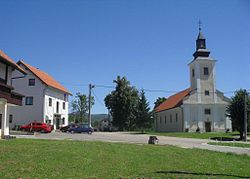Lovinac, Lika-Senj County
Lovinac | |
|---|---|
 | |
| Coordinates: 44°23′N 15°41′E / 44.39°N 15.69°E | |
| Country | |
| County | Lika-Senj |
| Area | |
• Total | 345.8 km2 (133.5 sq mi) |
| Population (2021)[2] | |
• Total | 943 |
| • Density | 2.7/km2 (7.1/sq mi) |
| Time zone | UTC+1 (CET) |
| • Summer (DST) | UTC+2 (CEST) |
| Website | lovinac |

Lovinac is a municipality in Lika-Senj County, Croatia.
Geography
The village of Lovinac is located 35 kilometers from Gospić to the southeast of the greatest Croatian karst field, Licko polje. At one time, the shortest trade routes from Lika's interior to the sea went through Lovinac.
The new highway which was recently built alongside the village has resulted in more tourism.
Population/Demographics
It has 1,096 inhabitants in the municipality, Croats make up 90% of the population.[3]
| Year of counting | Population[4] |
|---|---|
| 1857 | 1,423 |
| 1869 | 1,271 |
| 1880 | 1,044 |
| 1890 | 1,135 |
| 1900 | 1,320 |
| 1910 | 1,352 |
| 1921 | 1,365 |
| 1931 | 1,456 |
| 1948 | 929 |
| 1953 | 954 |
| 1961 | 869 |
| 1971 | 869 |
| 1981 | 640 |
| 1991 | 533 |
| 2001 | 288 |
Politics
Minority councils and representatives
Directly elected minority councils and representatives are tasked with consulting tasks for the local or regional authorities in which they are advocating for minority rights and interests, integration into public life and participation in the management of local affairs.[5] At the 2023 Croatian national minorities councils and representatives elections Serbs of Croatia fulfilled legal requirements to elect 10 members minority council of the Municipality of Lovinac.[6]
Villages
- Gornja Ploča - 22
- Kik - 3
- Ličko Cerje - 117
- Lovinac - 288
- Raduč - 11
- Ričice - 114
- Smokrić - 55
- Sveti Rok - 292
- Štikada - 175
- Vranik - 19
Pilar (population 45) and Vrkljani (population 27) are hamlets near Lovinac.
History
Above the town of Lovinac are the ruins of the medieval city of Lovinac in which artifacts from the Roman period have been found. In the Middle Ages the village was under the control of the noble family Lovinčić. At the beginning of the 16th century it belonged to count Ivan Karlovic. The Turks conquered it around 1522. After the expulsion of the Turks in 1689 the current Bunjevac population was brought in to settle the area.
Economy
The production of clothes and underwear usually takes place during the winter months from prepared wool, flax and hemp. Some parts of the native costume, especially vests, are decorated with gold or silver coins and toka. Also produced are type of local footwear called opanci.
Monuments and landmarks
- Old fort Lovinac
- Zdunić tower
- Kovacevic kula: notable for its being the only building in Lika left over from the time of Turk occupation. It is House 50 in Vranik.
Education
- Lovinac elementary school
References
- ^ Register of spatial units of the State Geodetic Administration of the Republic of Croatia. Wikidata Q119585703.
- ^ "Population by Age and Sex, by Settlements" (xlsx). Census of Population, Households and Dwellings in 2021. Zagreb: Croatian Bureau of Statistics. 2022.
- ^ "2001 census by settlement". Central Bureau of Statistics (Croatia) (in Croatian).
- ^ "1857-2001 census by settlement". Central Bureau of Statistics (Croatia) (in Croatian). Archived from the original on 2012-05-05.
- ^ "Manjinski izbori prve nedjelje u svibnju, kreću i edukacije". T-portal. 13 March 2023. Retrieved 10 June 2023.
- ^ "Informacija o konačnim rezultatima izbora članova vijeća i izbora predstavnika nacionalnih manjina 2023. IX. LIČKO-SENJSKA ŽUPANIJA" (PDF) (in Croatian). Državno izborno povjerenstvo Republike Hrvatske. 2023. p. 8. Retrieved 13 June 2023.


